God

I was privileged to attend the ordination of a friend recently. For the first time, Michelle got to say the blessing over the bread, to break the bread and to give it to all of us with her hands.
Many tears, much joy.
As she handed me a small piece of the bigger loaf, I was reminded of how we, like the communion bread, are in the hands of others for so much of our lives. And how religion can be a thing of so much good or so much pain, depending upon whose hands it is in.
In the right hands, it’s a pathway to the divine. In the wrong hands …
It’s important that we always differentiate between religion and God. The two are distinct. God is always much bigger than any and all of our religions.

I am waiting for the music to return — the sonorous graces of laughter and kitchen clinking, of bird call on the hillside.
I am waiting for the music to return — the precarious arrangement of hope and memory that uplifts and guides.
I am waiting for the music to return — the band, the orchestra, the seisiún, the jam, the people who make and craft sound.
Instead, I am stranded in an eschatological posture like pause on my mp3 player. The Wifi Spirit does not respond and even if I could connect, the playlist I have randomized is sore lacking. I miss the people who make these sounds. I miss their voices.

If Christians stopped bickering about church, presenting sex as a first-order concern, telling other people how to lead their lives, and lending our name to minor-league politicians, what would we have to say?
We need to figure that out, because we are wearing out our welcome as tax-avoiding, sex-obsessed moral scolds and amateur politicians.
In fact, I think we are getting tired of ourselves. Who wants to devote life and loyalty to a religion that debates trifles and bullies the outsider?
So what would we say and do? No one thing, of course, because we are an extraordinarily diverse assembly of believers. But I think there are a few common words we would say.
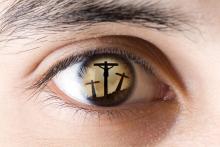
It seems like violence will never end. Portland. Seattle. Las Vegas. Isla Vista. Almost every day in Chicago. Not to mention Iraq, Boko Haram, the conflict in Ukraine, and the continued war in Afghanistan.
The Huffington Post just reported that “If it’s a school week in America, odds are there will be a shooting.” Since the Sandy Hook tragedy in 2012, the United States has averaged 1.37 school shootings per week.
And our culture is divided on how best to respond. One side declares we need to increase gun regulations. The other side insists we need more guns. The two sides are locked in a bitter political rivalry, using terms like “rights” and “responsibilities” and neither side will budge. One side will win the political battle concerning gun rights, but I fear that no matter who wins the battle it will only perpetuate the war.
I’m feeling despair, and from my Facebook feed, I know many others are feeling the same way. After all, this is so much bigger than guns; it’s about a culture of violence. But please, don’t fall into despair. We have too much work to do.

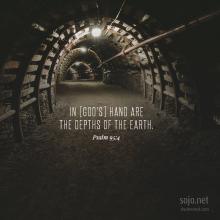
Two weeks ago in Soma, Turkey, a coal mine explosion left 301 people dead. It was the country’s worst mining disaster, but it wasn’t the first — and it wasn’t the last, as multiple fatal accidents have happened in the two weeks since. The last time a mining disaster caught the world’s attention, we watched and waited and prayed during the rescue operation for the miners in Chile.
In Turkey, people protested in the streets of Soma — protested against Soma Mining for letting this happen, against their government for loopholes in safety rules. In response, the police issued a ban on protests and locked the city down. The ruling political party proudly announces that it has inspected that mine 11 times in the past 5 years; Soma Mining denies negligence. And the families of 301 persons mourn their losses.
This isn’t a faraway problem. In the United States, we don’t do as much traditional mining as we used to — instead, we do mountaintop removal. This has a human cost, too, in more insidious ways. The people living in Appalachia have higher rates of respiratory illness, cancer, kidney diseases, skin ailments, and more. And the landscape, which has the fingerprints of God in it, is being blown apart.
Psalm 95:4-5 says:
“In [God’s] hand are the depths of the earth; the heights of the mountains are [God’s] also. The sea is [God’s], for [God] made it, and the dry land, which [God’s] hands have formed.”
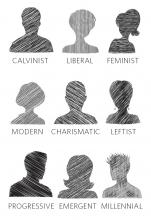
Christianity is full of labels.
Does caring about the environment make me a Liberal Christian?
Does opposing to the death penalty make me a Leftist Christian?
Does believing that women can preach make me a Christian Feminist?
Does believing in anti-violence make me a Christian Pacifist?
Does taking an anti-war stance make me an Anabaptist Christian?

Reading the Bible from the comfort of my couch, I find myself pointing fingers at individuals like Elijah. I can throw them under the bus for missing the point. It's easy for me to see how they got it all wrong. I'm amazed how apparent the presence of God can be one minute and the very next minute they sink deep into despair with this "woe is me" attitude — all the while thinking God has abandoned them.
But, as an onlooker, I have the privilege of seeing the whole story. I'm not living in the moment waiting for things to unfold. The Bible has extended to me the privilege of seeing the big picture, which makes it easy to see that while God is sometimes found on the mountain, or in those big cinematic experiences — conquering prophets, healing the sick, reviving the dead, conquering death — other times he is found in the valley, or in that still, small voice.
But then again, I have to wonder if I'm really any different? Don't I have the same struggles today? How often do I get caught up in the circumstances and lose sight of the big picture? I have some big mountain top experience — the money comes through, the deal works out, I got the job, my fear and anxiety dissipate, the mission trip is life changing, the sermon was exactly what I needed to hear — and, it never fails, the next minute I feel as though God has abandoned me. Doubts surface about whether or not God really has my best interest at heart. I wonder if he can even use someone as broken as me.
What causes such a drastic change?
After wrestling with this a little more, I came to a disheartening conclusion — I have a tendency to seek an experience instead of God.

Sometimes it's hard to blame people for rejecting God, because many Christians present a God that is ugly, cruel, unfair, and utterly horrific. Thus, when people avoid Christianity, they're actually shunning their ugly perception of it.
When you hear people talk about God, what type of God are you imagining? When you speak of God, what type of God are you communicating?
Unfortunately, society's obsession with success, politics, business, security, wealth, and comfort has hijacked the way we see and interpret God — even Christians are guilty of this.
It's easy to manipulate God to fit our own agendas, to use religion to rationalize our actions, to wield spirituality as a weapon, and manipulate theology to rationalize our sins.

The seasonal items aisle in the grocery store is a work in progress. Stuffed bunnies are being replaced by garden gnomes. Cans of sunscreen will soon inhabit the shelves that displayed egg-coloring kits a few days ago.
Easter is over.
Well, not completely. Boxes of purple and yellow Peeps are stacked on clearance tables in the middle of the aisle. Chocolate rabbits are available for half-price.
And tombs are being emptied.

Editor's Note: This post is adapted from a sermon preached by the Rev. Dr. Randle R. (Rick) Nixon.
Some of us have stood at a tomb, faced an open grave, scattered the ashes of one beloved. We know what it’s like to be confronted with the stark reality of death and the flood of conflicting emotions that comes with it. I’ve stood at different sites at Dry Creek Cemetery in Boise, Idaho, and the Veteran’s Cemetery next to it, to bury my father, my brother, my nephew, my step-father and-step sister, my brother-in-law, not to mention my beloved piano teacher, and a dear high school friend. Not so long ago I stood by the open grave of Patrice Heath as her casket was lowered into the ground. We prayed and wept and celebrated her life, but it is not an easy thing, under any circumstances, to lay a loved one to rest.
The ancient story of Lazarus being raised from the dead in John 11:1-45 is just such a situation. It’s also another occasion to encounter Jesus in his divinity and his humanity. It’s a long, complicated story. You have heard it read. I will not attempt to unpack it all.

Andrew Bird is one of my favorite musicians. I love the way he makes a one-man band, looping over his own violin playing, singing, whistling, and stomping to create beautiful songs. No two live performances are the same. And once, when I saw him in D.C., he played a new song that was still being written — one that had come from his heart, but he hadn’t yet finished and didn’t think it had an end.
He told us he wrote the song during the BP oil spill, often called “Deepwater Horizon,” that happened in the Gulf of Mexico. During that disaster, over 200 million gallons of crude oil spewed into the Gulf for days on end from a hole nobody could plug, and the whole country watched it happening live.
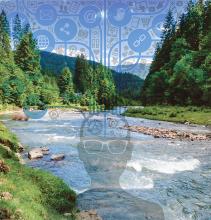
This year, some have given up Facebook for Lent. Others joined the “National Day of Unplugging” on March 7-8, putting away their phones, tablets, and laptops for a 24-hour digital Sabbath designed to slow people down in an increasingly hectic world.
According to the National Day of Unplugging website, people unplugged in order to dance, sleep, write, play, reflect, relax, reset, tune in, chill out, stay sane, and be more connected.
But wait a second — be more connected? That seems odd, since the promise of social media is that it will strengthen connections. Facebook links us instantly to hundreds of friends, family members, co-workers, and neighbors. Twitter enables us to follow people and collect followers of our own. LinkedIn links us to colleagues through an enormous professional network.
Social media seems to be all about connections. But its links have serious limitations.

Let those who boast, boast in this, that they understand and know me, that I am the Lord; I act with steadfast love, justice, and righteousness in the earth, for in these things I delight, says the Lord.” (Jeremiah 9:24, NRSV)
Pride has taken many forms in my life, but most dangerously in this: I have taken myself far too seriously. You wouldn’t think that a neurotic worrier who spent eight years in therapy would be full of pride. But for years I was utterly consumed with anxiety over what would happen in my life, because I believed that it should go a certain way and that I had both the responsibility and ability to bring that about.
So there’s nothing like having your worst fear come true — 19 months* of unemployment in a bad economy — to show you how small you really are, especially compared to God.
It was kind of amazing.

I became a member of Young Koreans United (YKU), a Korean American grassroots group providing solidarity to the people’s movement for democracy, human rights, and reunification of Korea in 1986. YKU was instrumental in forming the National Korean American Service & Education Consortium (NAKASEC); established 20 years ago to build a progressive Korean American voice on major civil rights issues. I joined the NAKASEC board a few years back. Throughout this time, I have tried to provide a clergy presence whenever I can to show that ending the suffering of immigrant families, including that of the 1 out of 7 undocumented Korean Americans, is also a concern of persons of faith.
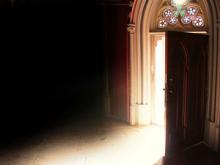
Recently, a large wealthy church decided to break up with my denomination. I’m not 100 percent sure I know why. But the no-regrets explanation they wrote implied that religious differences between us were too severe for them to stay committed to our relationship.
Religion has a way of making people do extraordinary things to create peace and unity. It also, as we know well, has a destructive capacity to turn people against one another. It can make us grip our convictions so tightly that we choke out their life. We chase others away, then say “Good riddance” to soothe the pain of the separation. Even more alarming, too many religious people insist on isolating themselves and limiting their imagination about where and how God can be known.
All these realities take on a sad irony when we read about God promising to be outside the walls, present with different people in different places. What does it look like when God defies the restrictions we presume are in place?

“Jesus was led by the Spirit into the wilderness to be tempted by the devil.”
Thus begins the spiritual drama of Lent, the forty days before Easter that commemorates Jesus’ wilderness experience. No human, not even Jesus, can escape the temptation of the devil.
Just before Jesus was led into the wilderness, he was baptized in the Jordan River by John. As the Gospel of Matthew reports, when Jesus emerged from the water “a voice from heaven said, ‘This is my Son, my Beloved, with whom I am well pleased.’”
Jesus’ identity as God’s Son had always been true, but he received confirmation of his relationship with God at his baptism.

Is Eve all about sex? Or might she want something else? Our popular imagination turns Eve into a receptacle for one set of our fantasies. Our fixation on Eve’s sexuality causes us to overlook the story’s major themes and what they might mean for our common life together. Indeed, biblical scholar Ken Stone shows that Genesis 2-3 has a lot more to say about food than it does about sex. Even if becoming “one flesh” is about sex, and maybe it’s not, there’s all kinds of references in the passage about what the first humans may or may not eat.
The story tells us directly what Eve wants. She doesn’t want to tempt Adam. And she doesn’t want a snake curling suggestively around her body. Eve wants wisdom.
And she gains wisdom.
Let’s review some of the overlooked details in this story.
